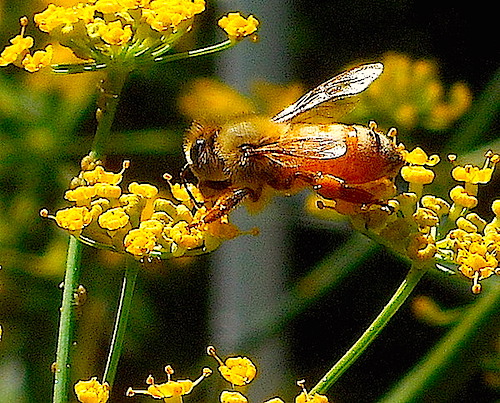Search
Recent comments
- UK-israhell.....
3 hours 40 min ago - albania.....
3 hours 48 min ago - israhell crap.....
4 hours 6 min ago - waste of cash....
6 hours 44 min ago - marles' bluster....
7 hours 5 min ago - fascism français....
7 hours 9 min ago - russian subs in swedish waters....
7 hours 48 min ago - more polling....
7 hours 17 min ago - they know....
12 hours 5 min ago - past readings....
13 hours 4 min ago
Democracy Links
Member's Off-site Blogs
do bees matter?...
 bee
bee
We are losing billions of bees every year to many complicated causes, including climate change, decreasing crop diversity and habitat loss. Why does it matter if bees are around?
"Save the bees!" — these calls to action usually come with a quote attributed to Albert Einstein: "If the bee disappeared off the face of the Earth, man would only have four years left to live."
Problem is, there's no evidence Einstein ever said that. And that statement also simply isn't true. If all the bees died tomorrow, we would still be able to grow food — just maybe not the sort you'd like.
Why's that?
It comes down to how different plants are pollinated. Wind-pollinated crops such as wheat, rice, and corn would continue to thrive, whereas you'd have to say goodbye to flowering crops, which includes most fruits and vegetables.
That's because animals, so not just bees, but also hoverflies, bats, birds, beetles and more, are involved in the pollination of 90% of the world’s flowering plants.
And here comes the honeybee, right?
Well... honeybees do, of course, pollinate flowers. But they're not the stars of the show.
"The general public confounds bees with the honeybee," said Isabelle Dajoz, a pollination ecology researcher and professor at the Sorbonne University in Paris. "It would be the same situation if, for example, you were talking about birds and people think that when you talk about birds, you talk about chicken, or you when you talk about mammals, people would think only of sheep."
There are around 20,000 different species of bees. Yes, you read that right. Most are wild, solitary, and highly specified to certain plants, which make them much better at pollinating. Bumblebees, for example, perform buzz pollination — while holding onto the flower they, you guessed it, buzz loudly to release the pollen, something honeybees can't do. And it's not just bumblebees that are so good at their jobs.
Even though we can't accurately measure the value of this wild bee pollination, crops around the world would suffer without it. Yields in the United States are already lower due to wild bee decline, and a recent study found that globally, we may have already lost a quarter of wild bee species. This also has major implications for life at higher trophic levels.
"Lots of animals depend on diverse plant communities for their food, for their nesting habitat. For example, lots of birds, lots of little mammals will eat the fruits or seeds of plants," said Dajoz. There's no telling how devastating wild bee loss is to both our food security and the stability of ecosystems.
Are honeybees in trouble?Honeybee colonies are definitely suffering losses due to climate change and intensive agriculture, but the idea that they are dying off is only partially correct, according to German Beekeepers Association DIB. Because they are managed by humans and receive veterinary care, they are comparatively safe.
Have we've been saving the wrong bees all along?
Yes, and we need to stop obsessing over honeybees and turn our attention to wild ones. There's no need to become a backyard beekeeper to save the bees. It actually makes the situation worse!
Read more: https://www.dw.com/en/whats-the-big-deal-if-bees-are-dying/a-57572721
So? Let's spray some insecticide?... Kill of the honey bees? Make the honey traders unhappy? Insecticides would kill of the wild bees as well...
See also: https://www.yourdemocracy.net.au/drupal/node/27957
FREE JULIAN ASSANGE NOW ##################
- By Gus Leonisky at 20 May 2021 - 9:31pm
- Gus Leonisky's blog
- Login or register to post comments
jolie bees...
Angelina Jolie has posed covered in live bees for National Geographic, to highlight the need for bee conservation and to support female beekeepers.
Key points:The photograph and accompanying "living portrait" were shot by photographer and amateur beekeeper Dan Winters, and required the Academy Award winner to remain still for 18 minutes as the insects crawled all over her.
"It just felt lovely to be connected to these beautiful creatures. There's certainly a hum. You have to be really still and in your body — in the moment — which is not easy for me," Jolie told National Geographic .
"You put a few things up your nose and in your ears so you don't give them as many holes to climb in."
Prior to the photoshoot, Jolie was wiped with pheremones to calm the bees.
"We couldn't shower for three days before. Because they told me, 'If you have all these different scents, shampoos and perfumes and things, the bee doesn't know what you are'," she said.
Read more:
https://www.abc.net.au/news/2021-05-21/angelina-jolie-bees-portrait-national-geographic/100154926
FREE JULIAN ASSANGE TODAY ZZZZZZZZZZZZZZZZZZZZ!!!!!!